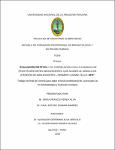| dc.contributor.advisor | Alva Arévalo, Alenguer Gerónimo | |
| dc.contributor.advisor | Román Vílches, Olger Dawis | |
| dc.contributor.author | Perea Alva, Erika Francis | |
| dc.contributor.author | Romaní Ramírez, Raúl Antony | |
| dc.date.accessioned | 2017-02-21T14:15:51Z | |
| dc.date.available | 2017-02-21T14:15:51Z | |
| dc.date.issued | 2015 | |
| dc.identifier.uri | http://repositorio.unapiquitos.edu.pe/handle/20.500.12737/4074 | |
| dc.description.abstract | El objetivo del estudio fue determinar la correlación entre la evaluación dietética y la ganancia de peso en gestantes adolescentes que acudieron al Módulo de Atención de Adolescentes – Rosmery Lozano Tello. 2015. Estudio de enfoque cuantitativo no experimental, del tipo longitudinal, prospectivo y analítico. La muestra fue de 70 gestantes adolescentes. Para la evaluación dietética se utilizó un cuestionario de frecuencia de consumo de alimentos cuantitativo y un recordatorio de 24 horas (R24H) por cuatro días. Los puntos de corte del R24H para la interpretación del porcentaje de adecuación fueron: muy bajo:<75 %, bajo: 75-89 %, adecuado: 90-110 % y sobreadecuado: >110 %. Para conocer si la ganancia de peso gestacional fue baja, adecuada o alta, primero se obtuvo el pesado ganado por diferencia del peso inicial y el peso alcanzado a término de gestación, luego el peso ganado se evaluó teniendo en cuenta la clasificación recomendada de ganancia de peso gestacional para adolescentes según estado nutricional pregestacional. Los resultados fueron procesados y analizados con el programa SPSS Statistics versión 22. Se utilizó la prueba estadística Chi cuadrado para variables categóricas, y en caso de analizar la correlación de variables ordinales se usó la Prueba Tau b o Tau c de Kendal. Los resultados fueron: 74.3% no estudia ni trabaja; 81,4% no alcanzaron la madurez biológica; 58,6% presentaron ganancia de peso baja y 11,4% alta. En adecuación energética, 17,1% tuvieron consumo muy bajo, 40,0% bajo, 31,4% adecuado y 11,4% sobreadecuado; en carbohidratos, 48,6% adecuado; en proteína, 35,7% adecuado. En grasas totales, 54,3% adecuado. Se concluye que se acepta la hipótesis planteada, es decir existe correlación entre la evaluación dietética y ganancia de peso en gestantes adolescentes; por ello el monitoreo de ganancia de peso y soporte nutricional deben ser actividades básicas en la atención prenatal. | es_PE |
| dc.description.abstract | The objective of the study was to determine the correlation between dietary evaluation and the weight gain in pregnant women attending care module of adolescents - Rosmery Lozano Tello. 2015. Study of nonexperimental quantitative approach, longitudinal, prospective and analytical type. The sample was 70 adolescent pregnant women. Dietary evaluation was a quantitative food frequency questionnaire and a reminder of 24 hours (R24H) for four days. The breakpoints in the R24H for the interpretation of the percentage of adequacy were: very low: ˂75%, low: 75-89%, right: 90-110% and on suitable: ˃110%. To see if the gestational weight gain was low, adequate or high, first was heavy cattle by difference of initial weight and the weight reached at end of pregnancy, then gained weight was evaluated taking into account the recommended classification of adolescents according to pre-pregnancy nutritional status for gestational weight gain. The results were processed and analyzed with the program SPSS Statistics version 22. We used the statistical test Chi square for categorical variables, and if you analyze the correlation of ordinal changeables was used the Tau test b or Tau c of Kendal. The results were: 74.3% does not study or work; 81.4% did not reach biological maturity; 58.6% had low weight gain and 11.4% high. In energy fitness, 17.1% had very low consumption, 40.0%, 31.4% right and 11.4% on suitable; carbohydrates, 48.6% suitable; in protein, 35.7% suitable. Absolute fat, 54.3% suitable. It is concluded that the hypothesis is accepted, there is a correlation between dietary assessment and weight gain in pregnant adolescents; therefore monitoring of weight gain and nutritional support should be basic activities in the prenatal care. | en_US |
| dc.description.uri | Tesis | es_PE |
| dc.format | application/pdf | es_PE |
| dc.language.iso | spa | es_PE |
| dc.publisher | Universidad de la Amazonía Peruana | es_PE |
| dc.rights | info:eu-repo/semantics/openAccess | es_PE |
| dc.rights | Attribution-NonCommercial-NoDerivs 3.0 United States | * |
| dc.rights.uri | http://creativecommons.org/licenses/by-nc-nd/3.0/us/ | * |
| dc.source | Universidad Nacional de la Amazonía Peruana | es_PE |
| dc.source | Repositorio institucional - UNAP | es_PE |
| dc.subject | Evaluación nutricional | es_PE |
| dc.subject | Dieta | es_PE |
| dc.subject | Embarazo en adolescencia | es_PE |
| dc.subject | Ganancia de peso | es_PE |
| dc.title | Evaluación dietética y su correlación con la ganancia de peso en gestantes adolescentes, que acuden al módulo de atención de adolescentes – Rosmery Lozano Tello. 2015. | es_PE |
| dc.type | info:eu-repo/semantics/bachelorThesis | es_PE |
| thesis.degree.discipline | Bromatología y Nutrición Humana | es_PE |
| thesis.degree.grantor | Universidad Nacional de la Amazonía Peruana. Facultad de Industrias Alimentarias | es_PE |
| thesis.degree.level | Título Profesional | es_PE |
| thesis.degree.name | Licenciado en Bromatología y Nutrición Humana | es_PE |
| thesis.degree.program | Regular | es_PE |


